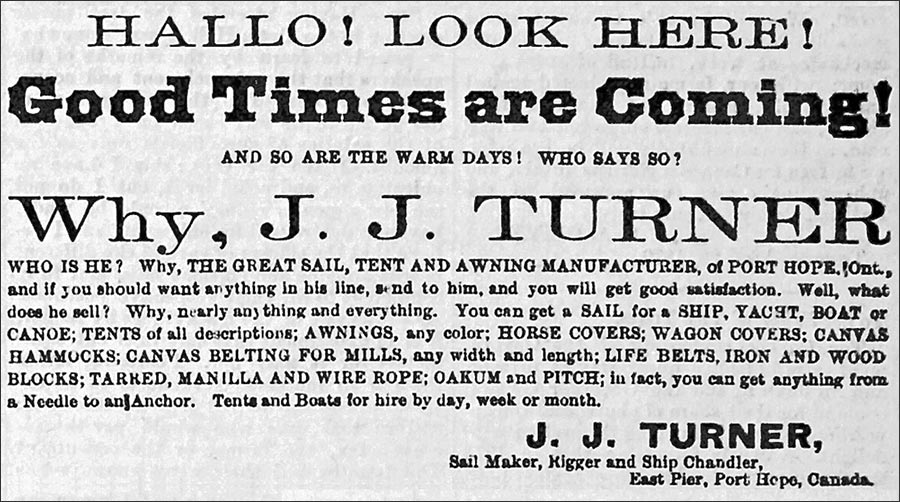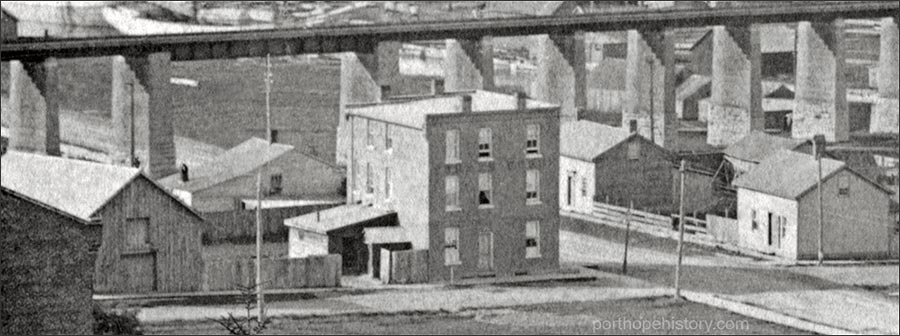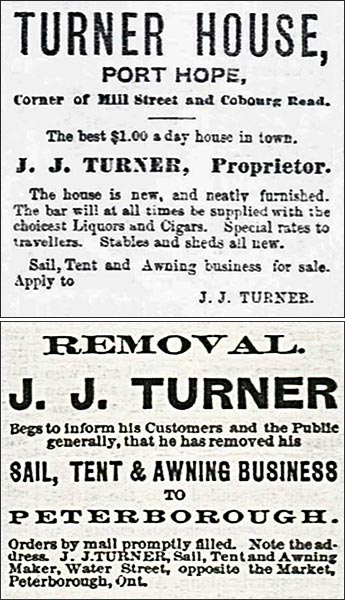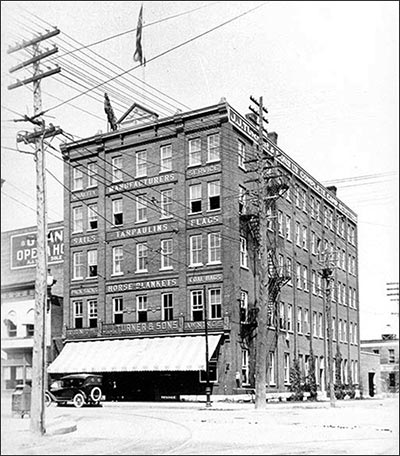John James 'JJ' Turner

JJ Turner ad from The Port Hope Times April 16, 1879
from The Port Hope Times August 19, 1880
Mr. Turner is making four new sails for the schooner Eliza White, now being refitted. The sails purchased from the Sir J. A. MacDonald, recently converted from a scow to a barge, have been repaired.

Billhead
from The Port Hope Times Thursday May 25, 1882
The Lindsay Post says—Mr. J. J. Turner of Port Hope was in town on Tuesday and wickedly took away with him orders for five new awnings. Mr. Turner's canvas and awnings are always satisfactory—they can be hauled up and stowed away without that profanity which usually accompanies manoeuvres with the home-made kind. Even the loungers on the sidewalks look up and on seeing 'Turner' stamped on the cotton call him blessed.
from The Port Hope Times July 9, 1885 page 7 (advertisement)
TURNER HOUSE
MILL Street, PORT HOPE
HAVING LEASED this new and well-furnished House, the undersigned intends to make it one of the best hotels in Town. It has excellent light, airy rooms. The Dining Room is well supplied, and in the Bar will be found the best Liquors and Cigars. Splendid Stabling.
J. CORNISH,
Late of American Hotel.

Turner House Hotel, with stable in back, on the SE corner of Mill and Peter Streets 1882
from The Evening Guide November 23, 1911
THE TURNER HOUSE. COR. MILL AND Peter sts., Port Hope. Would make a first class boarding house and restaurant or store. Has 12 bedrooms, bathroom and parlor upstairs, good dining room, kitchen, store and large halls, large grounds and good stable. Apply to J. J. TURNER & SONS, Tent Manufacturers, Peterboro. On.
from The Evening Guide 2001
The tale of J. J. Turner
by David Harrison
When my family and I moved to Port Hope in the spring of 1999, I knew that we were coming to a town where I had family history.
My great-great-grandfather, J. J. Turner (after whom Turner House, home of the Port Hope Evening Guide, is named) is buried in Union Cemetery. But little did I know, until I began to do some digging, that behind his simple gravestone lies a tale of tragedy, drama, intrigue, and law-breaking. For it would seem that my great-great grandfather was run out of this town! So much for any boasting that I might muster about my Port Hope roots!
The story of J. J. Turner in Port Hope begins simply enough. John James (always referred to as "J. J.") came to Port Hope in 1875 in order to establish a tent and awning business. A few years previously, J. J. and his family had emigrated from England to Hamilton, and then moved to Port Colborne, where he began a canvas business with a partner named Soper.
Born in London in 1850, J. J. had served for seven years as an apprentice in sail-making, beginning at the age of 12. Coming to Port Hope, he opened his business in a warehouse on the East Pier, and dealt in all kinds of canvas products — awnings, tents, ensigns, sails, horse and wagon covers, hammocks, canvas pants and jackets, and canvas for threshing machines. And not only canvas — he capitalized on his waterfront location by renting boats and boathouses.
After running the canvas business for several years, J. J. made the move into the tavern business in 1881 by purchasing property at the corner of Mill and Cobourg Road (now Peter Street), where Turner House now stands. On this property was a barn which had been used for pressing hay. Shortly after purchasing the property, the barn burned in a fire in which, according to newspaper reports, four cows and a hog also perished. Fortunately for J. J., the property was insured. The Guide reports that 'the origin of the fire is a mystery, but no doubt it was the work of an incendiary.' (This wasn't the first time arson had touched J. J. — about four years earlier,
 in April
of 1877, his boathouse burned, and he lost seven boats worth approximately $500. The Guide reported, with remarkable symmetry,
that 'the fire was, no doubt, the work of an incendiary.')
in April
of 1877, his boathouse burned, and he lost seven boats worth approximately $500. The Guide reported, with remarkable symmetry,
that 'the fire was, no doubt, the work of an incendiary.')The insurance settlement on the barn was sufficient to allow J. J. to build a new brick building (Turner House), which was completed in September, 1881. It was described as being 'quite an imposing structure, and adds much to the appearance of that quarter.' Sometime after the completion of the building, J. J. began a tavern, and named his new building 'Turner Hotel.'
Like our taverns of today, it could be a lively place. On October 10, 1883, a convict named McCabe, who had escaped from the Kingston penitentiary, arrived in the middle of the afternoon at Turner Hotel. He quite quickly got in an argument with a captain of a tub who was enjoying a break at the tavern. The argument escalated, and, according to testimony later given by J. J., "the captain said he could thrash him, and (the convict) said he could shoot him." McCabe took out a revolver, but J. J. grabbed it and took it away. The convict, unsuccessfully demanding that J. J. return the revolver to him, eventually gave up and asked for a glass of brandy. As he did not have the money to pay for it, J. J. agreed to give him the brandy, but kept his revolver and his overcoat as a deposit.
A little while after the escaped convict had left the premises, J. J. noticed in the paper that three convicts had escaped from Kingston. When the convict returned to the tavern late in the evening, J. J. immediately sent word to the police to come. McCabe once again demanded that he return his revolver. J. J. refused, but did hand over the overcoat. In a rage, the convict walked away "telling what he could do; he could lick any man or shoot any man who was there." When the police arrived, the convict bolted, and then turned a gun on the constable, who fired. According to the report of the incident, 'the ball must have struck in a most vital part, for the burglar had no time to fire his revolver. It was found cocked in his hand when picked up dead.'
There was not only high drama in J. J.'s life, but also tragedy, which struck in June 1882 when he and his family were returning from a boat ride. As the boat returned into the Port Hope harbour, it ran into a dredge, and his seven-year-old daughter, Henrietta Emma, was thrown overboard. She could not be saved in time, and drowned. Henrietta is buried, with her parents, in the St. John's section of Union Cemetery.

Billhead
From the events which unfolded after this tragedy, it seems to have marked an unfortunate turning point in the lives of the Turner family in Port Hope. Strange behaviour began to surface. In February 1884, a report of the Police Court states that J. J. was arraigned for disturbing a meeting of a group called the 'Saved Army,' presumably a religious gathering. According to the report, 'the evidence was clear that the meeting was disturbed by the defendant, laughing in a boisterous manner. The evidence for the defense proved that Mr. Turner was subject to paroxisms of hysterical laughter, and several instances were given where [an] attack was so severe as to entirely incapacitate him.' His case was discharged. And it wasn't just J. J. who was in trouble — his wife Jane was also tried for disturbing the meeting. Her case was withdrawn on payment of costs and a promise not to disturb the meeting again.
At about the same time, J. J. sold his canvas business, and concentrated his efforts solely on the tavern and hotel. It would seem that it was not only the selling of liquor by which he made his livelihood, but also the distilling of liquor, an activity which continued to get him in trouble with the law.
 In November 1884, J. J. was charged with selling the 'Curse of Canada' ('he owned the corn,' we are told), and on a Sunday,
to boot! This was his third offence, and the Guide noted approvingly that 'it is well that we have such an efficient Chief
of Police to look after these whisky dens.'
In November 1884, J. J. was charged with selling the 'Curse of Canada' ('he owned the corn,' we are told), and on a Sunday,
to boot! This was his third offence, and the Guide noted approvingly that 'it is well that we have such an efficient Chief
of Police to look after these whisky dens.'He was arraigned for sentence in the Police Court, and faced either fines and costs of $107 or spending 50 days in jail. He elected to go to jail, was locked up, but apparently relented after only a few hours and paid up. Facing the prospect of a mandatory prison sentence if convicted for a fourth time, J. J. sold his interests in Turner House, and announced his intention to leave for the 'Old Country.'
Thus ends the tale of J. J. Turner and Port Hope, a story which began with an industrious craftsman and small-business owner in 1875, and ended amidst tragedy, alcohol and law-breaking some nine years later.
J. J. may have returned briefly to England, but shortly thereafter re-established his canvas business in Peterborough. That business was carried on successfully by the Turner family into the 1950s, and the J. J. Turner Building still stands on George Street in downtown Peterborough.
Unless some future spate of research in Peterborough unveils some more secrets hidden from my family lore, it might just be that being run out of Port Hope was enough to set J. J. and his family back in the right direction, away from the lures of the tavern business, and apart from the tragedy of losing their young daughter.
from The Port Hope Times Thursday June 22, 1882
DROWNED
A Sad case of Drowning Which Took Place on Sunday
Just as it was growing dusk on Sunday four children of Mr. Turner, Mill street, were noticed by passers-by in a boat coming up the harbour. The boat drew up at the dredge and Mr. Turner's eldest daughter, Henrietta, a little girl about 8 years old, made an attempt to jump from the boat on[to] the dredge. In so doing she missed her foot and fell into the water, immediately sinking. The outcries of the frightened children brought a number to the spot. Mr. Turner was on the scene in a few moments, and frantically endeavored to rescue his child. Poles were used to endeavor to ascertain the whereabouts of the body, but to no purpose. Grappling irons were asked for and brought, but after vainly trying for some time to find any trace of his child's body, Mr. Turner dove several times, but without success.
This was about twenty minutes to nine, and it was not until about 9:30 the body was recovered, which was effected by putting pike poles under the dredge. It appears evident that the child was prevented from rising by floating under the dredge and there remaining. It is needless to say that the parents are almost distracted over this sudden bereaval—this breach in a happy family. The funeral took place on Monday, the remains being interred in the Union Cemetery.
In the end JJ Turner came back to Port Hope for interment with his wife and their daughters, Henrietta and Jane, and son Sidney, in the St John's section of Union Cemetery.
Use the form below to comment on this article. A name is required, optional email address will not be revealed.